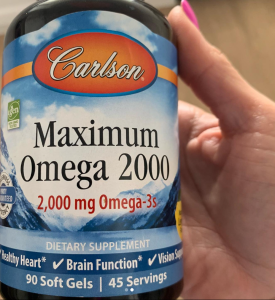Omega-3 Fatty Acids: Essential Facts
Introduction
 Omega-3 fatty acids are polyunsaturated fats that help build and maintain a healthy body. They can help improve mood, joint and bone health, mental health, sleep, and more. Not only is omega-3 great for reducing inflammation and strengthening the heart, but they also improve the brain’s health. This also makes them great for decreasing anxiety and depression as well.
Omega-3 fatty acids are polyunsaturated fats that help build and maintain a healthy body. They can help improve mood, joint and bone health, mental health, sleep, and more. Not only is omega-3 great for reducing inflammation and strengthening the heart, but they also improve the brain’s health. This also makes them great for decreasing anxiety and depression as well.
There are lots of ways to incorporate this nutrient in your diet, including food sources and supplements. Keep reading to learn more about this essential fatty acid.
Benefits of Omega-3
Pure omega-3 fatty acids have many health benefits including:
- Enhancing overall mood
- Improving joint & bone health
- Promoting sleep
- Decreasing anxiety
- Enlivening the health and vitality of your skin
- Reducing inflammation
- Minimizing ADHD symptoms
- Alleviating Metabolic Syndrome
- Processing fat in the liver
- Healing autoimmune diseases
- Strengthening heart health
- Restoring eye health
- Strengthens brain health
- Aiding memory
- Preventing Alzheimer’s disease
Where to Get Fatty Acids
Don’t forget to add pure omega-3 supplements to your shopping list! I recommend any of the following brands:
- Carlson – Maximum Omega 2000, 2000 mg Omega-3s, Healthy Heart, Brain Function & Vision Support, Lemon, 90 soft gels
- Nordic Naturals Ultimate Omega, Lemon Flavor – 1280 mg Omega-3-60 Soft Gels – High-Potency Omega-3 Fish Oil Supplement with EPA & DHA – Promotes Brain & Heart Health – Non-GMO – 30 Servings
- Wiley’s Finest Wild Alaskan Fish Oil – 3X Triple Strength Peak EPA DHA, 1000mg Omega-3s, SQF-Certified, 60 Softgels
Pro-tip: DO NOT buy an omega supplement that contains omega-6 or omega-9, which are inflammatory. We often over-consume them without knowing it because foods like nuts, corn, soy, and safflower oil are naturally high in omega-6. They’re also commonly added to food.
Omega-3 is also found naturally in a variety of foods, including:
- Fish and other seafood, especially cold-water fatty fish, such as salmon, mackerel, tuna, herring, and sardines
- Nuts and seeds, such as chia seeds, flaxseed, and walnuts
- Plant oils, such as canola oil and flaxseed oil (NOTE: I don’t recommend soybean oil, which contains phytoestrogens, which are endocrine disruptors)
This fatty acid is also added to certain fortified foods, such as eggs, juice, milk, and yogurt.
How to Use Omega-3
Take one to two soft gels daily, with food, or as directed by your health care professional or pharmacist.
Want to learn more about diet, exercise, health, and nutrition? Then follow me @mentalhealthhacker on Instagram and check out my other resources here.



